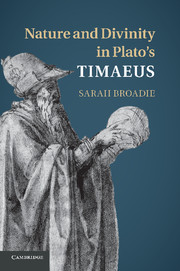Book contents
- Frontmatter
- Contents
- Acknowledgements
- What lies ahead
- Chapter 1 The separateness of the Demiurge
- Chapter 2 Paradigms and epistemic possibilities
- Chapter 3 The metaphysics of the paradigm
- Chapter 4 Immortal intellect under mortal conditions
- Chapter 5 The Timaeus–Critias complex
- Chapter 6 The genesis of the four elements
- Chapter 7 Divine and natural causation
- In conclusion
- Appendix on ‘parts of the paradigm’
- References
- General index
- Index locorum
Chapter 1 - The separateness of the Demiurge
Published online by Cambridge University Press: 05 December 2011
- Frontmatter
- Contents
- Acknowledgements
- What lies ahead
- Chapter 1 The separateness of the Demiurge
- Chapter 2 Paradigms and epistemic possibilities
- Chapter 3 The metaphysics of the paradigm
- Chapter 4 Immortal intellect under mortal conditions
- Chapter 5 The Timaeus–Critias complex
- Chapter 6 The genesis of the four elements
- Chapter 7 Divine and natural causation
- In conclusion
- Appendix on ‘parts of the paradigm’
- References
- General index
- Index locorum
Summary
World-making:
In this opening chapter I want to look at how Plato puts in place one of the metaphysical elements behind the cosmology. In a very deliberate way he gets the reader of the Timaeus to see our natural world, this orderly cosmos, as distinct and metaphysically separate from its origin. I shall particularly focus on the separateness, in Plato’s presentation, of the world-making god from the cosmos he constructs.
Some have thought that this separateness is one of those aspects of the account that Plato would not (or could not) have meant philosophical readers to take seriously – or, as is often said, ‘literally’. This is the inference of interpreters who, for one or another reason, begin by assuming that the rational view for Plato to have held would be one on which the divine world-making principle is not separate. The same conclusion would be drawn if the image of a separate Demiurge were simply to strike one as too childish to be meant seriously by a great philosopher. My approach, however, takes the opposite course. It starts by accepting at face value the account Plato has given, and then attempts to understand why he wanted a Demiurge separate from the world.
- Type
- Chapter
- Information
- Nature and Divinity in Plato's Timaeus , pp. 7 - 26Publisher: Cambridge University PressPrint publication year: 2011

